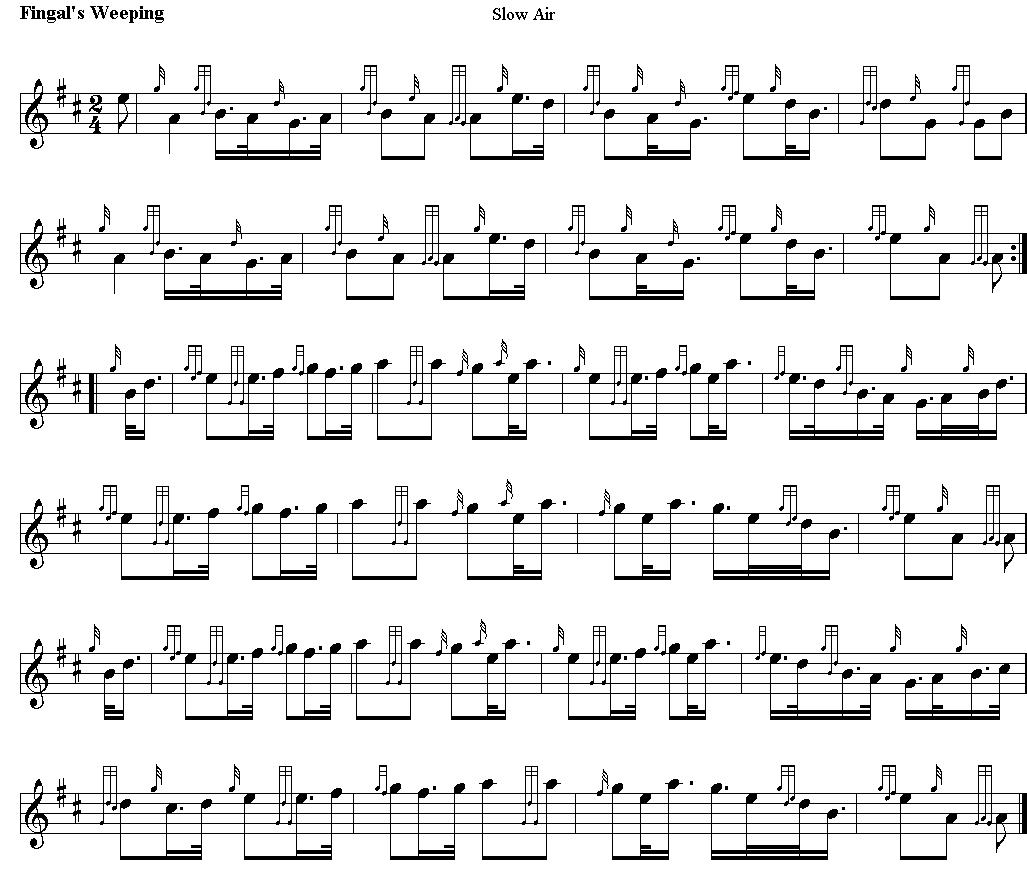|
Fingal may refer to an individual or the county in the Republic
of Ireland.
Fingal
(Fine Gallin
Irish,
meaning "foreign tribe", i.e.
Norsemen)
is a county
in the Republic
of Ireland.
It was formed from part of the former county
Dublin. The
Vikings referred
to the area as
Dyflinarskiri,
the hinterland of Dublin. The original name however derived from
the old Gaelic
Fionn Gall
meaning fair strangers, denoting the Norse, whereas south county
Dublin was
called Dubh Gall,
denoting the
occupying Danes. Early Anglo-Norman
versions of the
name include the similar Fiehengall, Fynnegal, Fyngal, and
Finegal, which
led to the mis-identification
with Fine Gall.
Fingalian
is an extinct language, a hybrid of
Old English
and Old Norse,
with Gaelic
influences, which was spoken by the people of
Fingal until the
mid-1800s.
In Irish mythology, the hero Fingal is known as Fionn mac
Cumhaill. Most of Fionn's early adventures are recounted in the
narrative The Boyhood Deeds of Fionn. He was the son of
Cumhall, leader of the Fianna, and Muirne, daughter of the druid
Tadg mac Nuadat who lived on the hill of Almu in County Kildare.
Cumhall abducted Muirne after her father refused him her hand,
so Tadg appealed to the High King, Conn of the Hundred Battles,
who outlawed Cumhall. The Battle of Cnucha was fought between
Conn and Cumhall, and Cumhall was killed by Goll mac Morna, who
took over leadership of the Fianna.
Muirne left the
boy in the care of Bodhmall and a fighting woman, Liath Luachra,
and they brought him up in secret in the forest of Sliabh Bladma,
teaching him the arts of war and hunting. As he grew older he
entered the service – incognito – of a number of local kings,
but each one, when he recognized Fionn as Cumhal's son, told him
to leave, fearing they would be unable to protect him from his
enemies.
The young Fionn
met the leprechaun-like druid and poet Finn Eces, or Finnegas,
near the river Boyne and studied under him. Finnegas had spent
seven years trying to catch the Salmon of Knowledge, which lived
in a pool on the Boyne and became all-knowing through its diet
of hazelnuts from a holy tree: whoever ate the salmon would gain
all the knowledge in the world. Eventually the old man caught
it, and told the boy to cook it for him. While cooking it Deimne
burned his thumb, and instinctively put his thumb in his mouth.
This imbued him with the salmon's wisdom, and when Finn Eces saw
that he had gained wisdom, he gave young Fionn the whole salmon
to eat. Fionn then knew how to gain revenge against Goll, and in
subsequent stories was able to call on the knowledge of the
salmon by putting his thumb to the tooth that had first tasted
the salmon.
In a story from
Violet Russell's Heroes of the Dawn, every year
for 23 years at Samhain, a fire-breathing man of the Tuatha Dé
Danaan, Aillen the Burner, would lull the men of Tara to sleep
with his music before burning the palace to the ground, and the
Fianna, led by Goll mac Morna, were powerless to prevent it. The
Fianna were a band of warriors also known as a military order
composed mainly of the members of two clans, "Clan Bascna" and
"Clan Morna", the Fenians were supposed to be devoted to the
service of the High King and to the repelling of foreign
invaders. Fionn arrived at Tara, armed with his father's
crane-skin bag of magical weapons. He kept himself awake by
touching the point of his magically red-hot spear to his
forehead. The pain kept Fionn awake, allowing him to pursue and
kill Aillen with the same spear. After that his heritage was
recognized and he was given command of the Fianna: Goll
willingly stepped aside, and became a loyal follower of Fionn,
although in some stories their alliance is uneasy. Fionn
demanded compensation for his father's death from Tadg,
threatening war or single combat against him if he refused. Tadg
offered him his home, the hill of Allen, as compensation, which
Fionn accepted.
Fionn's sword was
called "Mac an Luinn".
According to the
most popular account of Fionn's death, he is not dead at all,
rather, he sleeps in a cave, surrounded by the Fianna. One day
he will awake and defend Ireland in the hour of her greatest
need. In one account, it is said that he will arise when the
Dord Fiann, the hunting horn of the Fianna, is sounded three
times, and he will be as strong and as well as he ever was.
 |



